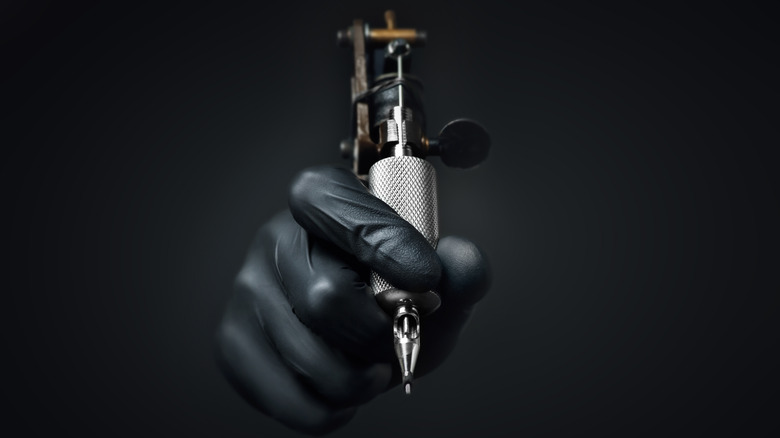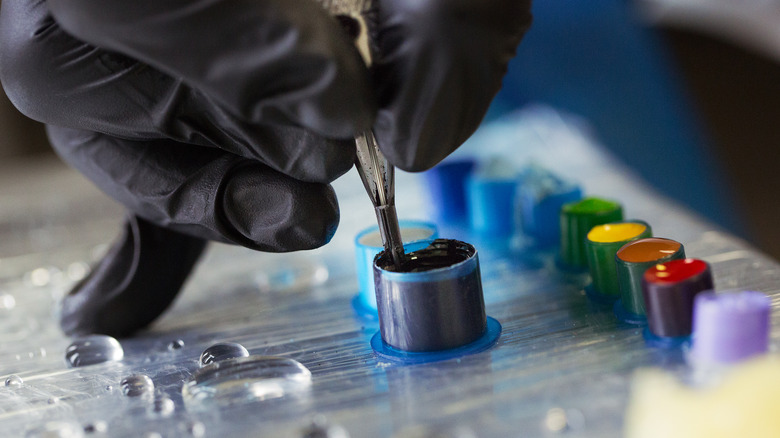We Need To Talk About The Controversial Implications Of Blackout Tattoos
Blackout tattoos have gone global. It's not uncommon to open Instagram and see tattoo aficionados covered in solid black ink, but that's not to say there's no controversy surrounding them. Simply put, blackout tattoos (also known as black work) are an entirely blacked-out section of the skin. As for the section in question, that could be anything from a small spot, to a larger area — and some choose to go all the way, with limbs entirely covered in black ink.
This option has become a way for some people hoping to cover up tattoos they no longer love seeing. After all, sometimes laser removal just isn't effective. However, what may have been a solution for many has since become an art form in its own right. As a Singapore-based tattoo artist credited with popularizing the look via social media, Chester Lee, told People, "I had been suggesting the blackout tattoos for massive cover-ups, and slowly letting people see the beauty in black work."
This has transformed the practice from a correctional technique to a new form of skin art. However, it's important to note that, blackout tattoos have also been at the center of controversy. There are a few implications to consider in wake of their popularization.
There's a lot to be said for entirely changing a skin color
While blackout patches over smaller sections of skin aren't likely to come across as controversial, it's not exactly surprising that going for a larger portion (like, say, a limb) is a pretty contentious decision to make. That's especially true if the person receiving the tattoo is white. As award-winning tattoo artist, Elisheba Mrozik explained to Byrdie, there's a lot to be said for opting to completely change one's skin color. Speaking to the outlet, she explained that it was downright problematic, "It is also [insensitive] to think that blacking out your skin as a white person is a 'trendy' thing when, for centuries, being dark-skinned in this nation has been a curse and cause for pain, strife, economic injustice, stolen wealth and legacies, ruinous incarceration rates, violent death, and dreams deferred."
It's a take fellow tattoo artist, Jazmin also Paulino shared. In an interview with Popsugar, she pointed out, "Considering historically how [white people] treated us for our skin color, it could be deemed hypocritical, depending on the person's intention."
Granted, the outlet also noted that even a well-meaning recipient should be aware of the implications of blacking out their skin. Even the best-intentioned person isn't exempt from concerns being raised. And, as Mrozik told Byrdie, "Ignorance of something does not excuse people from its consequences."
...but context is always everything
Here's the thing. just as it would be dismissive of the Black experience for someone to entirely alter their skin color through blackout tattoos, it would also be problematic to suggest anyone who dabbles in blackwork is participating in a new trend. For starters, it's important to acknowledge that tattoos featuring large portions of blacked-out skin have long held significance in Samoan culture. In fact, according to Tattoo Tribes, certain tattoos are considered sacred, or tapu. As such, it's crucial to make a distinction between someone covering up their tattoos (or even opting for a blacked-out body), and someone participating in a centuries-old tradition.
Another vital point to keep in consideration is that not only white people are opting into blackout tattoos. As tattoo artist Belle Atrix told Allure, in wake of the backlash she received for her own blackout tattoos, "I'm from a mixed race family, my grandmother is African-American, so the whole 'wanting to change my race' [accusation] had me cracking up when I heard about it."
Ultimately, blackout tattoos, while gaining popularity, are a controversial concept. So, just as you would likely take time to consider getting any tattoo, it's necessary to do some serious thinking prior to committing to the ink.

